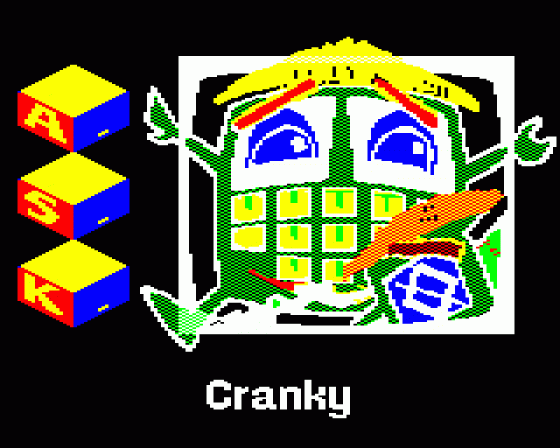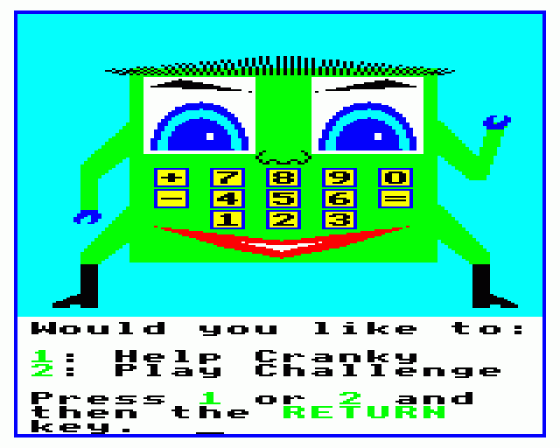


| Genre: | Unknown Genre Type |
| Publisher: | Acornsoft/ASK |
| Cover Art Language: | English |
| Machine Compatibility: | BBC Model B |
| Release: | Professionally released on Cassette |
| Available For: | BBC Model B, BBC/Electron & Dragon 32 |
| Compatible Emulators: | BeebEm (PC (Windows)) PcBBC (PC (MS-DOS)) Model B Emulator (PC (Windows)) |
| Original Release Date: | 8th March 1983 |
| Original Release Price: | £9.95 |
| Market Valuation: | £8.08 (How Is This Calculated?) |
| Item Weight: | 64g |
| Box Type: | Cassette Single Plastic Clear |
| Author(s): | Jeannie Billington |
Variant Items
There are 0 other items featuring this same game (that we know about!). Click any of them for their details.
Active Auctions
Closed Auctions
Auction Price Watch
Worried you're being ripped off? Closing prices on eBay can help you decide what a reasonable price is for a particular item.
Full Instructions
Cranky
Cranky the crazy calculator doesn't like rain. On wet days Cranky's circuits get damaged, so that some of the calculator keys don't work any more. The fault is shown on 1-100 number square, and you can repair Cranky by constructing the numbers in the pattern. You've only got two numbers with which to do this though. If you make the repair successfully, then you can use Cranky as a calculator! Sometimes it's easy, but sometimes you have to make lots of calculations. Careful planning will help you repair Cranky quicker.
Helping repair Cranky will give children a chance to explore the interesting relationships between numbers, at their own pace, thus giving confidence will number manipulation.
In All ASK Programs
|
|
Remember: once you have typed in your response a program will deal with it until you press the RETURN key. |
|
|
You can always return to the beginning of a program by pressing the ESCAPE key. |
|
|
You can rub out anything typed in, before the RETURN key is pressed, by using the DELETE key. |

|
Means : Please press the space bar to carry on with the program. |

|
Means : the program did not expect the response it has just received. Perhaps there was a typing error? In any case, to carry on, just press the space bar and try again. |

|
All of our programs incorporate sound. There are various volume levels - holding down the CTRL key and pressing the S will change the level - keep pressing the keys until you are happy with the volume. |
Introduction
Cranky is a happy pocket calculator. When it rains, Cranky doesn't like it. This is because the rain damages some of Cranky's circuits. You can see which circuit has been damaged because it appears in Cranky's eyes. This pattern then appears on the 1-100 number square, and you can help repair Cranky by constructing the numbers in the pattern shown. Because Cranky is damaged, you can only use the numbers 3 and 5 to do this. However, it is possible to make all of the numbers in the patterns with these two keys. As you repair Cranky, you can use the numbers you make, as you go along, to help you construct new numbers.
There is another side to the game too: If you decide to Play Challenge, then you can pick the two numbers which you want to use to repair Cranky's circuits. Be careful though, as not all of the pairs of the keys you can choose, will enable you to repair Cranky. At the end of either game, if you are successful, you can use Cranky as an adding and subtracting calculator.
Playing with Cranky gives children a chance to find out the relationship between numbers for themselves. It also lets them explore the effects of constant addition or subtraction, and so gives more confidence in number manipulation.
How To Use
When you have loaded the program, the first thing you see is a picture of Cranky. You will now be asked if you want to "Help Cranky" or "Play Challenge". Press 1 or 2 and then the RETURN key. For "Help Cranky", the next menu that appears asks you what colour you want to use. Of the three, red is the easiest, blue is slightly more difficult and green is the hardest. Choose which colour you want, press 1, 2 or 3 and then the RETURN key. In "Play Challenge" you get the colour menu after you have chosen the two numbers. Within each level some patterns are harder to make than others.
Help Cranky
If you have selected this game you will now see that it is raining on Cranky. The spacebar symbol appears, and, when you have pressed it, Cranky's eyes will show you the patterns that represent it, Cranky's eyes will show you the patterns that represent the faulty circuits. The eyes will settle on one pattern and Cranky will ask you to help mend the fault using the 5, 3, +, - and = keys. When you press the spacebar again, the patterns on Cranky's eyes will be displayed on a 1-100 number square.
Your aim now is to make all of the numbers in the pattern shown. See if you can do it, without making any of the numbers outside of the pattern.
When you have pressed the spacebar to start playing, you have to type in a starting number. This can be 3, 5, 33, 35, 53 or 55, these being the only numbers you can make with the 3 and 5 keys.
You can now add numbers to, or take numbers from, your starting number. To add, press the + key, and type in your next number. To subtract, press the - key and type in the next number. If you want the sum of all of the numbers you have typed in so far, hold down the SHIFT key and press the = key (The T key has the same effect). The answer will be calculated, printed, and then highlighted on the number square.
Remember, you can only add and subtract numbers made with 5 and 3, or numbers you have already made on the number square. For example, if you start by typing 3 + 3 =, to give you 6, then at any time thereafter, you can type in the number 6. The game will not accept any numbers not already made.
If you press the = or T keys, to get the total, and it would have been less than 1 (the lowest number on the square) then the ? symbol appears, and a message telling you "Less than 1". When you press the spacebar, the last sequence you typed in will be erased (back to the last time you pressed = or T). The same will happen if the number is over 100 except that the message will be "More than 100".
When you have made all the numbers in the pattern, the pattern will flash, and the spacebar symbol appears. When you press it, the scene returns to Cranky. However, fixing one of Cranky's faults can often cause another one to occur, and, if this is the case, then you go back to the start of play again. You now have to fix the new fault shown.
If you mend all of Cranky's faults, as they occur, then you can use Cranky as an adding and subtracting calculator. Use Cranky in the same way as when you were fixing the faults, except now all of the numbers can be used.
Play Challenge
If you have decided to Play Challenge, then you have to select two numbers (in the range 1-9) which you want to use to try and make the pattern. Type the number you want and then press the RETURN key. Now do exactly the same thing for the second number. The play will now be the same as it was for Help Cranky. Watch out though, as with some choices of numbers you can't make all of the numbers in every pattern. Some choices are much harder than others. Part of the challenge is to find out which ones are which.
Educational Notes
This program is particularly suitable for children between the ages of eight and eleven, although many younger and older children, and adults, have also enjoyed playing with the game. The program helps children develop their own addition and subtraction techniques, by discovering number patterns and relationships, and inventing their own number strategies. The game also works by encouraging children to be creative by exploring ideas which interest them.
The "faulty circuits" that appear in Cranky's eyes all highlight different number patterns and relationships. The columns, rows and diagonals are the easiest ones to make, the multiples and rectangles are slightly more difficult, and the diamonds and saw-tooth patterns are the hardest. Through playing the game, children discover the patterns, and gain confidence in manipulating numbers. A first they should try adding and subtracting 5s and 3s (Help Cranky), but later they should choose their own two numbers.
It is important at ths stage that children have the opportunity of discovering the different types of pattern in their own way, and time, and that they are free to develop their own strategies for mending the "faulty circuits".
The game has been tried with many children and adults. Some use trial and error strategies to start with. Others spot that some patterns become easier of certain numbers are made first. These numbers may or may not be in the pattern. There are a whole variety of strategies and techniques that can be used. Finding out other people's strategies can be both interesting and informative.
Most importantly, the program gives children the opportunity of exploring their own ideas. All sorts of challenges and questions can emerge:- Can I make any number using 3s and 5s? How many different ways can I make 79? What is the quickest method I can use? Why can't I make all the numbers using 2 and 6? What would happen if I used multiplication and addition instead of subtraction and addition?
Children should be allowed to raise, and attempt to answer, their own questions. In doing this they are developing their inherent ability to act as mathematicians, and will discover that mathematics is exciting and creative, as well as useful.
Loading
CHAIN"" (RETURN)
Screen Designers
The following utilities are also available to allow you to edit the supplied screens of this game:
Cheats
Download
At least one physical version of this item is currently for sale in the shop.
A digital version of this item can be downloaded right here at Everygamegoing (All our downloads are in .zip format).
| Download | What It Contains |
|---|---|
| A digital version of Cranky suitable for BeebEm (PC (Windows)), PcBBC (PC (MS-DOS)), Model B Emulator (PC (Windows)) |
Report A Problem
We thank you from the bottom of our hearts if you report something wrong on our site. It's the only way we can fix any problems!
You are not currently logged in so your report will be anonymous.
Add Note
Release Country
Change the country to update it. Click outside of this pop-up to cancel.
Scan Of Selected Article
If you auction an item, it will no longer show in the regular shop section of the site.





